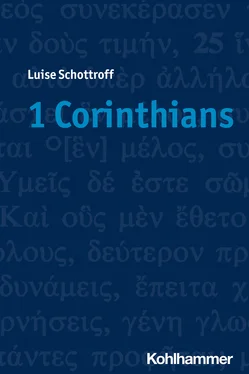4:7is the key to the comparison of »you« and »we« that follows, beginning with 4:8. The »you [plural]« that begins in 4:8 and the »you [singular]« in 4:7 belong together: an alleged counterpart in the congregation who would like to see himself or herself as superior to other members of the congregation and claims to have greater power than others. In Paul’s view this behavior presupposes that people forget that the good gifts they have received are an abundance supplied by God (see 1:4–5; 2:12). And they ignore reality.
And so, in 4:8he asks skeptically: Are you satisfied? Are you rich? Those addressed know that in the eyes of those around them they are neither satisfied nor rich (see 1:26–28) and that there are many people in addition to themselves that suffer from hunger, poverty, and violence. Paul’s questions are meant make them aware that every claim to superiority ( kauchasthai ) is unrealistic and isolating. The »we« in 4:8–12 is the »we« of the congregation, the body of Christ (on this see the basic information above after 2:5). The »you« does not refer to opponents, but individuals or small groups in the congregation who let themselves be enticed into a behavior from which they promise themselves more security than from their proximity to one who has been crucified. Here, in a society shaped by power struggles and violence, a congregation seeks a way to an alternative. And that is not so simple, for people do not yet know a life together in solidarity, and the structures of society impede it. Paul mocks them in 8b: It would be useful if you were already holding the reins of power, for then we could rule with you. But the reality is that neither you nor we are at the helm; quite the contrary (see 1:26–28). I rather doubt that these questions should be seen as ironic or, indeed, caustically ironic. 185It is more likely that they reveal, given the reality, the absurd consequencesof the power struggles.
4:9To all attempts at accommodation with the structures of violence, Paul now opposes a shocking image. 186We have been sent by God as the last of all in society. We can be compared to and identified with the ones condemned to death in the processions of Rome’s violent mass gatherings. First, we turn to the details in 4:9a: The ones Paul is naming as »we« in 4:9a are the »male and female apostles.« God has put us, the male and female apostles, on exhibition ( apedeixen ) in the place of those who are the last of all in society. Here the concept of the apostolate is applied to all who are sent by God to proclaim the gospel. To the men and women who serve as God’s messengers, proclaiming and spreading the peace of Israel’s God for all nations in the world, 187God has assigned the place of the last onesin society. That is their reality and the place assigned them by God. Being an apostle does not entail having a special role in the congregation. 188All members of the body of Christ have an analogous task to fulfill for the sake of the gospel. The description of the God-given place of the male and female apostles fits all members of the congregation in Corinth (see below). It is both reality and divine determination. They stand in this place as messengers sent by God. So that there is absolute clarity about what kind of place this is, Paul says: We are »last of all,« like those »sentenced to death« in the violent games.
The rare word epithanatios 189(those » sentenced to death«) refers to those who are condemned to die and whose execution is part of the public displays of violence. In these events for the masses in amphitheaters, theaters and other locations for extravaganzas, they staged a person’s public humiliation and execution as a climax of what was offered. 190Paul compares himself and those like him with these people, truly the »last« in a society based on dictatorial violence. The doomed are either prisoners of war or people condemned to death because of deeds that are in Rome’s view crimes (see 15:32). In 4:9b Paul gives the reason he made this comparison: he, those like him and these »last ones« are publicly humiliated and despised. They are a »spectacle« ( theatron ). Then he names the horrific spectators: »the world ( kosmos ), angels and mortals.« He has before his eyes the sight of these spectators at the games of violence, gluttons for lust and death, and he sees more than just a group of people. He sees the entire world as gluttons for murder, and even mythological beings—angels 191—are taking part. In 4:13b Paul returns to these spectators once more.
Violent extravaganzasbefore hordes of spectators had a fundamental significance for the Roman Empire. They got people used to murder and humiliation: »The empire’s rulers had learned to use for their own purposes festivals formerly initiated for religious reasons, in order to control the masses all the more securely.« 192Carcopino 1979 also rightly points to the tokenism involved in these games in the face of the actual powerlessness of the people: »In a period in which the assemblies were inactive and the senate merely parroted what they had been told, what the people were thinking could only come out in the frenzied atmosphere of the munera and the ludi .« 193Along with the gladiators, the people were supposed to get caught up in the moment. »The people were brutalized, and their choosing sides heightened the rush that always grabs people when they go to a game. They cheered on one or the other of the gladiators.« 194With this as background, it once again becomes clearer why Paul is criticizing the rivalry within the congregation and why he regards solidarity with the Crucified One, and with those who are being crucified, as irreconcilable with power struggles. In Corinth, the Roman colony, violent games were even more frequently held than in other cities and had great relevance for the life of the city. 195
Paul directs our attention in 4:9 (and 4:13) to the victims of the executions and to the spectators.The following text from Seneca (died 65 CE) also deals with the spectators at the violent games, even if from an elite distance. Seneca also presupposes that he can stay away from mass gatherings of this sort. Very likely few people would have envisioned for themselves such an option. The public pressure to attend and to participate was enormous. 196Seneca describes a midday event at which it wasn’t gladiators but criminals condemned to death who killed one another until no one was left. This slaughter was even more popular with the spectators than the battles between gladiators, according to Seneca. He went to the midday event because he thought the slaughters only took place at the morning and afternoon programs. At midday he expected a sanguine interlude.
… the greater the mob with which we mingle, the greater the danger. But nothing is so damaging to good character as the habit of lounging at the games; for then it is that vice steals subtly upon one through the avenue of pleasure. What do you think I mean? I mean that I come home more greedy, more ambitious, more voluptuous, and even more cruel and inhuman,—because I have been among human beings. By chance I attended a mid-day exhibition, expecting some fun, wit, and relaxation, —an exhibition at which men’s eyes have respite from the slaughter of their fellow-men. But it was quite the reverse. The previous combats were the essence of compassion; but now all the trifling is put aside and it is pure murder. The men have no defensive armour. They are exposed to blows at all points, and no one ever strikes in vain. Many persons prefer this programme to the usual pairs and to the bouts »by request.« Of course they do; there is no helmet or shield to deflect the weapon. What is the need of defensive armour, or of skill? All these mean delaying death. In the morning they throw men to the lions and the bears; at noon, they throw them to the spectators. The spectators demand that the slayer shall face the man who is to slay him in his turn; and they always reserve the latest conqueror for another butchering. The outcome of every fight is death, and the means are fire and sword. This sort of thing goes on while the arena is empty. You may retort: »But he was a highway robber; he killed a man!« And what of it? Granted that, as a murderer, he deserved this punishment, what crime have you committed, poor fellow, that you should deserve to sit and see this show? In the morning they cried »Kill him! Lash him! Burn him! Why does he meet the sword in so cowardly a way? Why does he strike so feebly? Why doesn’t he die game? Whip him to meet his wounds! Let them receive blow for blow, with chests bare and exposed to the stroke!« And when the games stop for the intermission, they announce: »A little throat-cutting in the meantime, so that there may still be something going on!« … The young character, which cannot hold fast to righteousness, must be rescued from the mob; it is too easy to side with the majority. Even Socrates, Cato, and Laelius might have been shaken in their moral strength by a crowd that was unlike them … 197
Читать дальше












